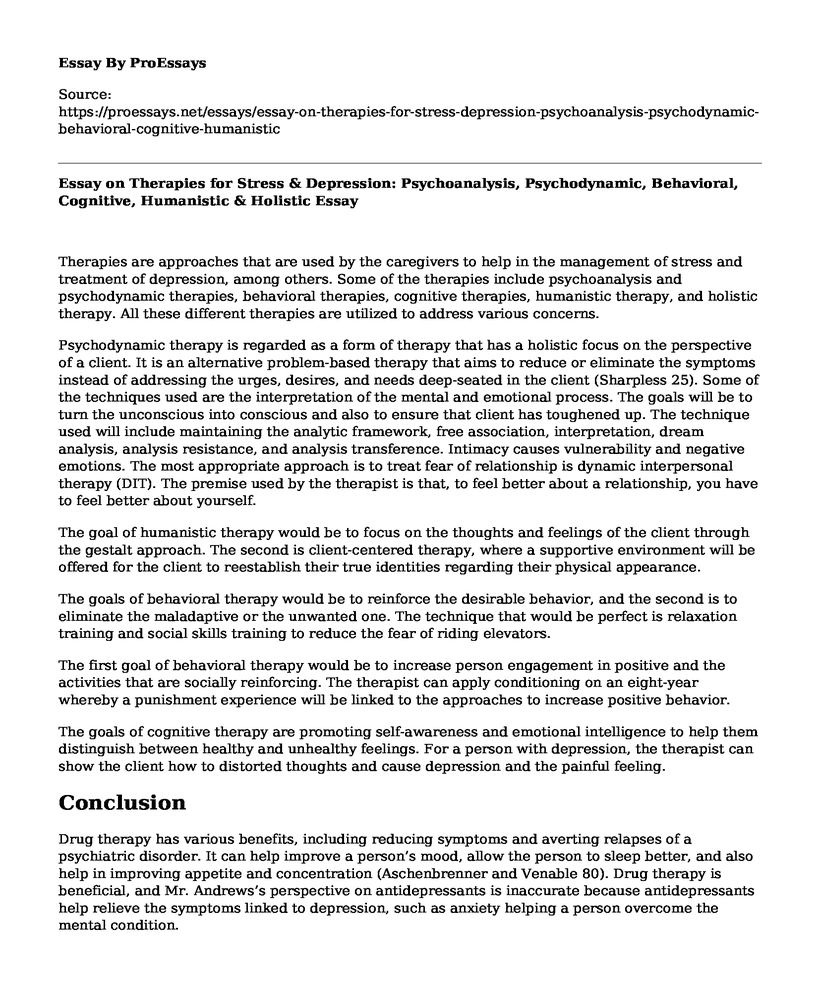Therapies are approaches that are used by the caregivers to help in the management of stress and treatment of depression, among others. Some of the therapies include psychoanalysis and psychodynamic therapies, behavioral therapies, cognitive therapies, humanistic therapy, and holistic therapy. All these different therapies are utilized to address various concerns.
Psychodynamic therapy is regarded as a form of therapy that has a holistic focus on the perspective of a client. It is an alternative problem-based therapy that aims to reduce or eliminate the symptoms instead of addressing the urges, desires, and needs deep-seated in the client (Sharpless 25). Some of the techniques used are the interpretation of the mental and emotional process. The goals will be to turn the unconscious into conscious and also to ensure that client has toughened up. The technique used will include maintaining the analytic framework, free association, interpretation, dream analysis, analysis resistance, and analysis transference. Intimacy causes vulnerability and negative emotions. The most appropriate approach is to treat fear of relationship is dynamic interpersonal therapy (DIT). The premise used by the therapist is that, to feel better about a relationship, you have to feel better about yourself.
The goal of humanistic therapy would be to focus on the thoughts and feelings of the client through the gestalt approach. The second is client-centered therapy, where a supportive environment will be offered for the client to reestablish their true identities regarding their physical appearance.
The goals of behavioral therapy would be to reinforce the desirable behavior, and the second is to eliminate the maladaptive or the unwanted one. The technique that would be perfect is relaxation training and social skills training to reduce the fear of riding elevators.
The first goal of behavioral therapy would be to increase person engagement in positive and the activities that are socially reinforcing. The therapist can apply conditioning on an eight-year whereby a punishment experience will be linked to the approaches to increase positive behavior.
The goals of cognitive therapy are promoting self-awareness and emotional intelligence to help them distinguish between healthy and unhealthy feelings. For a person with depression, the therapist can show the client how to distorted thoughts and cause depression and the painful feeling.
Conclusion
Drug therapy has various benefits, including reducing symptoms and averting relapses of a psychiatric disorder. It can help improve a person’s mood, allow the person to sleep better, and also help in improving appetite and concentration (Aschenbrenner and Venable 80). Drug therapy is beneficial, and Mr. Andrews’s perspective on antidepressants is inaccurate because antidepressants help relieve the symptoms linked to depression, such as anxiety helping a person overcome the mental condition.
Works Cited
Aschenbrenner, Diane S, and Samantha J. Venable. Drug Therapy in Nursing. Philadelphia: Wolters Kluwer Health/Lippincott Williams & Wilkins, 2009. Print.
Sharpless, Brian A. Psychodynamic Therapy Techniques: A Guide to Expressive and Supportive Interventions. , 2019. Print.
Cite this page
Essay on Therapies for Stress & Depression: Psychoanalysis, Psychodynamic, Behavioral, Cognitive, Humanistic & Holistic. (2023, Aug 08). Retrieved from https://proessays.net/essays/essay-on-therapies-for-stress-depression-psychoanalysis-psychodynamic-behavioral-cognitive-humanistic
If you are the original author of this essay and no longer wish to have it published on the ProEssays website, please click below to request its removal:
- Thoughts About "Take Your Pills" Documentary Essay
- Essay Sample on Mental Health Treatment
- The Barbie Doll and Female Beauty Standards - Essay Sample
- Essay Sample on Role of Nurses in the Recovery Process of PTSD Patients
- Essay Example on 20th Century Dating: Evolving Perception, Same Role
- Adolescent Eating Disorders: The Impact of Social Media - Essay Sample
- Essay on Therapies for Stress & Depression: Psychoanalysis, Psychodynamic, Behavioral, Cognitive, Humanistic & Holistic







